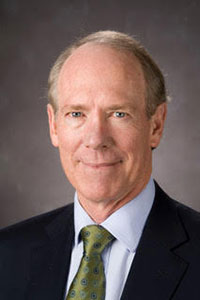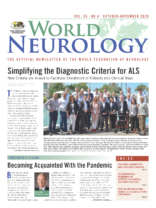By the time this edition of World Neurology is available, it will have been more than eight months since the world had to learn to deal with COVID-19. In that time, our lives and practices have changed dramatically. Social distancing, travel restrictions, and educational activities have forced us to adapt to what is effectively a new world. In some countries, the pandemic is flaring again, resulting in death, disability, and the consumption and diversion of resources. In others, populations are variably safer but still constrained.

William Carroll, MD
It is nevertheless heartening to see and experience the intent of many of our colleagues at local, national, and international levels collaborating to record quality data so as to better understand the short-, medium-, and long-term effects of COVID-19. Groups such as the European Academy of Neurology’s “EAN NEuro-covid ReGistrY (ENERGY),” the World Health Organization’s Neuro-COVID Global Forum, and the COVID-19 Neuro Research Coalition are all actively involved in developing platforms and directions to facilitate the capture of neurological involvement in the pandemic. In many countries, clinicians, public health workers, and hospital facilities are struggling to care for those affected. Within this activity, we are also witnessing a disturbing trend of disbelief and even outright opposition toward the need for change in social behavior. There is a niggling sense that beneath the surface, there is a latent feeling of every person for themselves.
It is essential in such environments that professional organizations, such as ours, remain united in our efforts to care for those with neurological diseases, record accurately those with COVID-19-related neurological illness, support colleagues in the battle with COVID-19, and maintain the training of our next generation of neurologists.
As I have mentioned before, the WFN was already moving to a more electronic-based medium for its educational and communication activities prior to COVID-19. There are now several changes underway within the WFN that will likely drive new and innovative programs. These may result in transformation of WFN operations and potentially persist after the pandemic has subsided.
In communication, the London office has completed the first step to improve its ability to reach all member societies and their individual neurologists. Almost all 122 member societies have contributed to the updating of their contact details, for which the trustees and office staff are most grateful. The second step will be to ensure that material disseminated to member societies is timely, meaningful, and reciprocal. In an era where physical meetings may never be the same again, this is an important and essential development. Examples of how this development has already proven beneficial are the recent Council of Delegates Annual General Meeting, the trustee election, and the promotion of three successful educational programs. In all of these, up-to-date information was communicated to all member societies and through many of them to their memberships.
For the first time in the history of the WFN, a virtual Annual General Meeting was held on Sept. 9. This was notable also for the large number of member society delegates, given that in a non-World Congress of Neurology year, as 2020 is, attendance numbers are typically on the low side. Business was conducted in the usual format and essential motions proposed and carried. Dr. Morris Freedman was declared the new elected trustee following a smooth electronic electoral process contested by six high quality candidates. The clarity, rapidity, and accuracy of the election were greatly appreciated by the office staff, who are usually tasked with such matters manually. While this format lacked the usual intense discussions and face-to-face canvasing, it allowed many more societies to participate without having to travel or to arrange proxies.
Improved communication with member societies has also aided the promotion and the production of educational activities. Two WFN specialty groups and a regional organization have illustrated this aspect effectively. First, the Neuromuscular Disorders Specialty Group, chaired by Prof. John England, partnered with the Spanish Neurological Society to hold a virtual International Congress on Neuromuscular Diseases (ICNMD) Sept. 11-14. Some 800 registrants from almost 50 countries attended the congress and will be looking forward to the next congress in July 2021 in Valencia. Second, the Tropical and Geographical Neurology Specialty Group has just begun the second series of its highly popular and successful, mainly fortnightly, Neuroinfection sessions. Chaired by Prof. Chandrashekhar Meshram and supported by the Indian Academy of Neurology, the topics have updated many common and not-so-common neurological infections. This series will continue through to Dec. 12. The most recent WFN-related educational event was the AFAN/WFN E-Learning Day held on Oct. 10 and run out of Tunis. Eight lectures in four sessions dealing with stroke, with particular emphasis on Africa, were delivered by experts from the African, the European, and the American Academies of Neurology and from the World Stroke Organization. It was a great example of collaborative effort. Altogether there were approximately 1,100 registrants from 80 countries. Thanks go to all involved in the execution of this event and especially to Prof. Riadh Gouider, who was tireless in his efforts to ensure a rewarding e-learning experience. These meetings were all promoted by the WFN through the usual media sources and by direct communication with member societies.
World Brain Day 2020 also exemplified the value of improved communication in promotional terms. The WFN was greatly benefited by the partner organization, the International Parkinson and Movement Disorder Society (IPMDS), both around the July 22 commencement and at the final press conference held during the IPMDS virtual Congress in September. This year, the promotions and activities related to World Brain Day reached more than 50 million people globally, just outdistancing the numbers from the 2019 WBD. Other key social media parameters generated exceptional numbers for WBD. The WBD Committee, chaired by Prof. Tissa Wijeratne, was extremely successful in generating local and regional activities on and around July 22. Many of these are shown on the WFN website: www.wfneurology.org/wbd.
The WBD Committee is already planning the 2021 program. The two promotional videos prepared earlier this year dealing with WFN activities and the upcoming 2021 World Congress of Neurology were shown during the inaugural AFAN/WFN E-Learning Day lunch and coffee breaks and will no doubt be employed through to the World Congress of Neurology. The Brain Health Initiative is close to presenting the first of a series of five videos aimed at the general population. We hope that it and its successors will promote improved awareness of the importance of brain health and the provision of quality neurological care.
While we all miss the pleasure of meeting and communicating face-to-face with our colleagues, the resumption of that personal interaction with the developments described above will significantly enhance the cohesion and success of the WFN. Meanwhile, I wish everyone a safe coexistence with the pandemic. •
Prof. William M. Carroll
President, World Federation of Neurology
